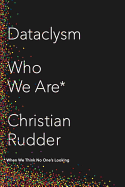
Christian Rudder's role as Virgil through the digital world has been 10 years in the making. He is a co-founder of OkCupid, the online dating site, and chief analyst of its vast repository of data. As more and more information was collected from the site's millions of users, trends and patterns began to emerge. He realized that this deep, varied dataset of person-to-person interaction could be used to examine taboos such as race. "I could go and look at what actually happens when, say, 100,000 white men and 100,000 black women interact in private. The data was sitting right there on our servers," he says. Unlike survey responses, in which respondents can edit their answers or even outright lie, the unvarnished truth lay at his fingertips.
Here, Rudder combines existing work with his own original research, analyzing information from OkCupid, Google, Twitter, Facebook, Reddit, Tumblr and other websites. He reveals his findings in a series of vignettes organized into three main categories: the data of people connecting, the data of division and the data of the individual. Rudder is even-handed in exemplifying both the good and the bad taking place on the Internet, "a vibrant, brutal, loving, forgiving, deceitful, sensual, angry place" that reflects its users. Finally, though, technology is offering an "unprecedented sociological opportunity" and helping to transform our understanding of race, politics, sex, beauty, humor, anger and other subjects previously challenging to quantify.
A book based on statistics could easily be dry and boring, but not with Rudder at the helm. If numbers are the narrative, he is the consummate storyteller--smart, witty and a perceptive interpreter. --Shannon McKenna Schmidt, contributing writer, Shelf Awareness

